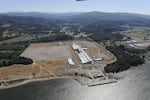
The site at the Port of Kalama where NW Innovation Works had proposed a 90-acre methanol plant.
NW Innovation Works
Developers appear to be calling it quits on a long-planned and controversial proposal to build a $2 billion methanol plant on the banks of the lower Columbia River.
The Port of Kalama announced Friday that the developer, NW Innovation Works, had terminated its lease, effectively ending the project. It would have converted fracked natural gas into methanol to be shipped to Asia.
Like many industrial fossil fuel plans in the region in recent years, the plant had fomented debate over whether it could deliver jobs and economic vitality to Kalama, which straddles Interstate 5 about 40 miles north of Portland —or whether its potential to spew greenhouse gases caused more harm than good.
In a statement Friday morning, port officials laid blame on state regulators and Gov. Jay Inslee for “killing local, sustainable jobs just when the need is the greatest.” The port had claimed building the facility would have put 1,400 builders to work in construction, then provide 200 jobs to onsite employees.
“Jay Inslee stood on Kalama’s waterfront to tout the climate benefits of the project, then turned on us when he ran for president,” said Port Director Mark Wilson in the statement, referring to Inslee’s short-lived campaign for the 2020 Democratic presidential nomination.
Meanwhile, opponents cheered the separation. Diane Dick, a Cowlitz County resident and activist, said she felt “ecstatic” after years of fighting. She also fought a proposed oil-train terminal at the Port of Vancouver, which halted plans in 2018, and said she continues to fight a proposed coal terminal in Longview.
“I think the tide has turned on allowing greenhouse gas-emitting projects to go forward,” Dick said.
First proposed in 2014, the methanol refinery would have turned fracked natural gas from Canada into methanol. The methanol then would be shipped to China to make plastics. Proposed plans also included a 3-mile pipeline for transporting natural gas.
With NW Innovation Works’ pitch that methanol could replace other, more carbon-emitting fossil fuels emitted elsewhere in the world, the project initially garnered support. In 2015, Inslee told a crowd he felt the project “bodes well for Washington’s future.” By 2019, however, he came to oppose it and other fossil fuel proposals.
Around the same time, new information started to cast doubt on the project’s promise. OPB first reported in 2019 that the company had suggested to potential investors that its methanol could be sold as fuel in China, contradicting its public statements the methanol would be exclusively used to help make plastics.
Had the plant been built, regulators said it would have been one of the top 10 greenhouse gas emitters in Washington state. In December, the Washington Department of Ecology found it would have fumed almost 1 million metric tons of carbon dioxide into the air each year.
The project ran into regulatory difficulty a month later. On Jan. 20, the Washington Department of Ecology denied a necessary shoreline permit, citing the greenhouse gas emissions. The denial ultimately led to NW Innovation Works’ recent decision, the company said in a statement.
“In light of the recent Washington Department of Ecology’s decision to deny the (permit), the regulatory environment has become unclear and unpredictable,” NW Innovation Works said in a statement. Julie McIvor, a marketing coordinator, told OPB the company would not answer follow-up questions on Friday.
Still, both the port and the company had appeared prepared for a long push. Days after the permit denial, the two agreed on a three-year lease extension for the company’s offices at the port, The Daily News in Longview reported.
Environmental groups applauded its apparent demise. The Center for Biological Diversity wrote in a statement the plant was “a disaster waiting to happen.” Brett VandenHeuvel, executive director of Columbia Riverkeeper, said activists will continue to battle fossil fuel projects in the Pacific Northwest.
“Our region will continue to be threatened by fossil fuel projects, I have no doubt,” he said. “They want to continue to frack and drill and mine. And, you know, our communities are here to stand up to that.”